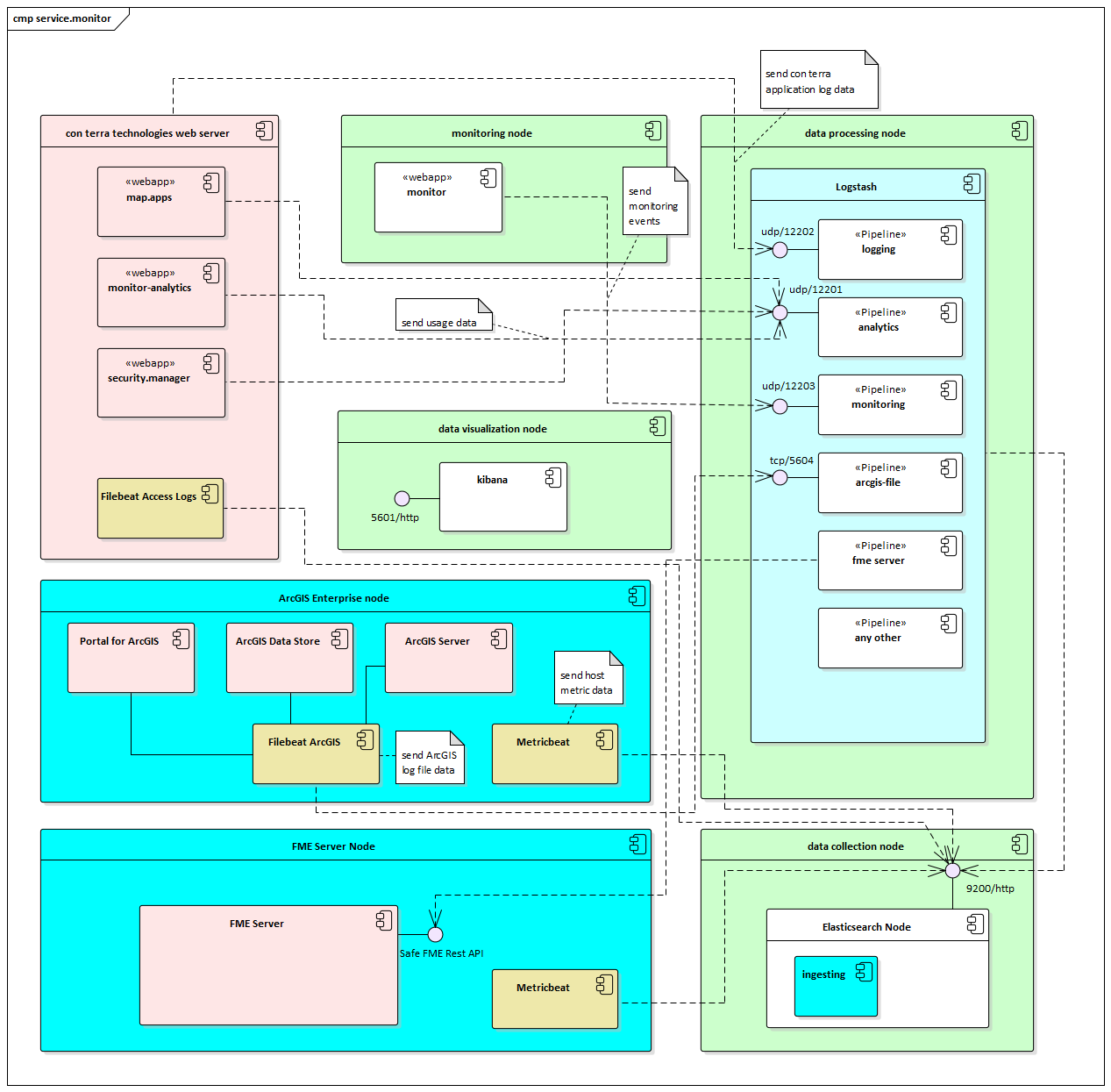Runtime environment
Operating system
-
Windows
-
Linux
service.monitor is a pure Java-based application and should run on any supported operating system, provided that the JDK / JRE requirements are satisfied.
Database
-
Oracle Database 11g*, 12c*, 18c, 19c
-
Microsoft SQL Server 2016*, 2017
-
PostgreSQL 9*, 10*, 11, 12
Browser
Latest stable version:
-
Google Chrome
-
Firefox (Latest ESR version is known to work)
-
Microsoft Edge
-
Safari
|
Internet Explorer 11
Esri has deprecated support for Internet Explorer 11 for the ArcGIS API for JavaScript. Support is limited in scope and Esri does not recommend using it (see system requirements). Furthermore, Microsoft recommends using Microsoft Edge instead of Internet Explorer 11. A modern browser is recommended for running map.apps line 4. Internet Explorer 11 is still supported for apps of line 3. (This applies especially to the product components integrated with map.apps) |
|
General Hints
|
Compatibilitymatrix with other con terra products
security.manager (SSO) |
security.manager (data collection) |
map.apps (data collection - Client) |
map.apps (data collection - Server) |
map.apps (dashboards) |
|
service.monitor 4.0 |
>= 4.4 |
4.4.0 |
>= 3.2 |
3.3.0 |
>= 3.3 |
service.monitor 4.1 |
>= 4.4 |
4.4 - 4.6.1 |
>= 3.2 |
3.3.0 |
>= 3.3 |
service.monitor 4.2 |
>= 4.4 |
4.4 - 4.7.1 |
>= 3.2 |
3.3.0 - 4.0 |
>= 3.3 |
service.monitor 4.3 |
>= 4.4 |
4.4 - 4.9.1 |
>= 3.7 & > 4.2.0 |
3.7 & >4.2 |
>= 3.7 |
service.monitor 4.4 |
>= 4.4 |
4.4.- 4.16 |
> 4.2.0 |
> 4.2.0 |
> 4.2.0 |
service.monitor 4.5 |
>= 4.4 |
4.4.- 4.18 |
> 4.2.0 |
> 4.2.0 |
> 4.2.0 |
service.monitor Analytics (data collection) |
>= 4.4 |
>= 4.4 |
> 4.2.0 |
> 4.2.0 |
> 4.2.0 |
service.monitor Analytics (dashboards) |
>= 4.4 |
>= 4.4 |
> 4.2.0 |
> 4.2.0 |
> 4.2.0 |
Runtime Environment Analytics Data Processing and Storage
The OpenSource products Elasticsearch and Logstash receive, process and store the collected events so that they can then be subjected to targeted research and analysis. For security and distribution reasons, it is recommended that you run these components on a separate host, independent of the application infrastructure.
Currently, these versions are recommended/supported:
| You can run service.monitor with a previous version of Elastic 7.x, but due to backwards checks of diagrams and dashboards (Kibana) we recommend to continously upgrade your cluster while residing in the version 7 major release. |
All components allow the software to run on Windows or Linux environments. For more information, please refer to Installation guide elasticsearch .
Architectural Considerations
Here are some basic recommendations you may follow when setting up service.monitor.
-
Run service.monitor applications separately from your applications - if your application server fails completely you are going to recognize this too late
-
Separate Elasticsearch and Logstash from your internet exposed applications - these are performing memory and cpu consuming operations.
-
Run Elasticsearch cluster with at least two nodes or be at least prepared for growing requirements

Memory and hard disk memory
The Elasticsearch components require resources for operation. The more data that needs to be processed, stored and searched, the more generously the system must be dimensioned. It does not make sense to stay below the minimum values mentioned here. However, the recommended values are only a recommendation based on current customer setups known to us. The operation of the Elasticsearch cluster must therefore be accompanied during the commissioning phase, especially with regard to these resource requirements. Index Lifecycle Management is used to ensure long-term operation (ILM).
Memory (minimal) |
Memory (recommended) |
Hard disk (initial value) |
|
Elasticsearch |
4GB |
8GB |
200GB |
Logstash |
1GB |
2GB |
1GB |
Kibana |
1GB |
2GB |
- |
Please see also .